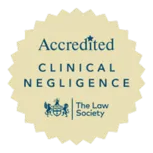
£160,000 Compensation for Missed Diagnosis of Dislocated Shoulder
Our client fell on to his left shoulder and went straight to the A&E department. X-rays showed he had sustained a fracture and he was sent home with a sling and analgesia.


Solicitor, Medical Negligence
In the UK, we all expect a certain standard of care when we go the doctors, and that’s certainly true if you’re taking your child for a medical appointment. So if something goes wrong with your child’s care and they didn’t receive a diagnosis for a medical condition, it can be extremely upsetting and have serious long-term consequences.
However, there are a number of options available to you as a parent/guardian, and, of course, it’s your right to choose whichever you feel is best for you and your family.
For free legal advice get in touch with our Medical Negligence Solicitors. We may be able to deal with your claim on a No Win, No Fee basis – ask us for details.




‘NHS: Urgent Mental Health Helpline’ by NHS (n.d.) ‘Find an urgent mental health helpline’. Available at: https://111.nhs.uk/triage/check-your-mental-health-symptoms (Accessed: 30/12/2023).
‘Samaritans: Contact Information by Samaritans’ (n.d.) Contact Samaritan. Available at: https://www.samaritans.org/how-we-can-help/contact-samaritan/ (Accessed: 30/12/2023)
‘SANE: Saneline Services’ by SANE (n.d.) Saneline Services. Available at: https://www.sane.org.uk/how-we-help/emotional-support/saneline-services (Accessed: 30/12/2023).
The Ombudsman. (n.d.). What we can and can't help with. Retrieved from https://www.ombudsman.org.uk/making-complaint/what-we-can-and-cant-help (Accessed: December 30, 2023).
The Ombudsman. (n.d.). Making a complaint. Retrieved from https://www.ombudsman.org.uk/making-complaint (Accessed: December 30, 2023).
The Ombudsman. (n.d.). The Ombudsman. Retrieved from https://www.ombudsman.org.uk/ (Accessed: December 30, 2023).
NHS. (n.d.). When to use 111. Retrieved from https://www.nhs.uk/nhs-services/urgent-and-emergency-care-services/when-to-use-111/ (Accessed: December 30, 2023).
NHS. (n.d.). Patient Advice and Liaison Services (PALS). Retrieved from https://www.nhs.uk/service-search/other-health-services/patient-advice-and-liaison-services-pals (Accessed: December 30, 2023).
NHS. (n.d.). Find your local integrated care board. Retrieved from https://www.nhs.uk/nhs-services/find-your-local-integrated-care-board/ (Accessed: December 30, 2023).
NHS. (n.d.). What is PALS (Patient Advice and Liaison Service)? Retrieved from https://www.nhs.uk/nhs-services/hospitals/what-is-pals-patient-advice-and-liaison-service/ (Accessed: December 30, 2023).
NHS. (n.d.). NHS Complaints Advocacy. Retrieved from https://www.nhs.uk/services/service-directory/nhs-complaints-advocacy/N10971865 (Accessed: December 30, 2023).
Simpson Millar Solicitors. (n.d.). Medical Negligence Solicitors. Retrieved from https://www.simpsonmillar.co.uk/medical-negligence-solicitors/ (Accessed: December 30, 2023).
Simpson Millar Solicitors. (n.d.). No Win No Fee Personal Injury Solicitors. Retrieved from https://www.simpsonmillar.co.uk/personal-injury-solicitors/no-win-no-fee-personal-injury-solicitors/ (Accessed: December 30, 2023).
Fill in the form below to get in touch with one of our dedicated team members, or call our team today on: 0800 260 5010